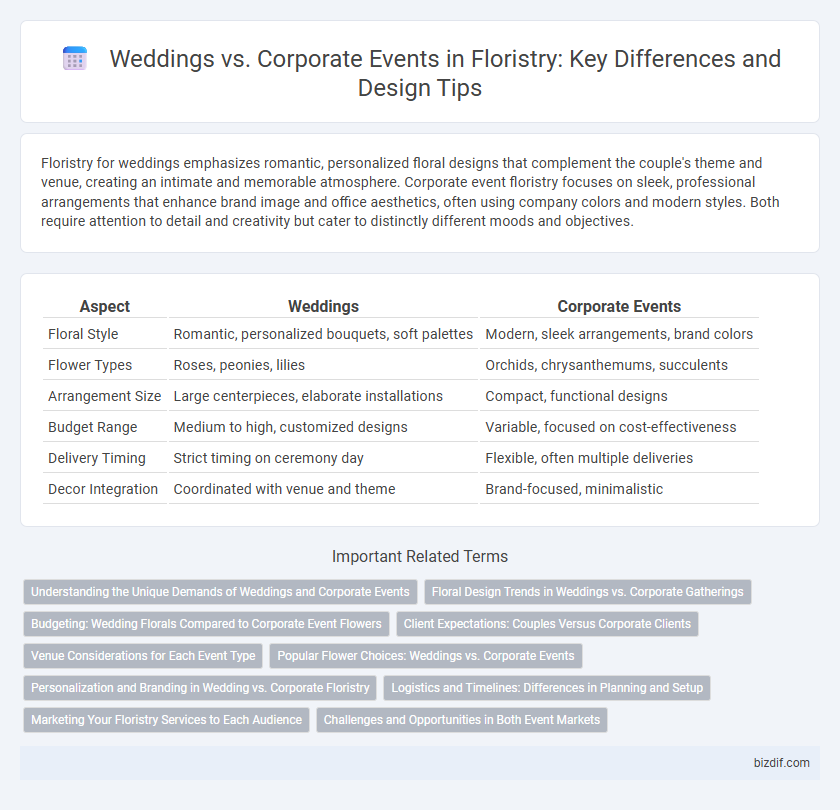Floristry for weddings emphasizes romantic, personalized floral designs that complement the couple's theme and venue, creating an intimate and memorable atmosphere. Corporate event floristry focuses on sleek, professional arrangements that enhance brand image and office aesthetics, often using company colors and modern styles. Both require attention to detail and creativity but cater to distinctly different moods and objectives.
Table of Comparison
| Aspect | Weddings | Corporate Events |
|---|---|---|
| Floral Style | Romantic, personalized bouquets, soft palettes | Modern, sleek arrangements, brand colors |
| Flower Types | Roses, peonies, lilies | Orchids, chrysanthemums, succulents |
| Arrangement Size | Large centerpieces, elaborate installations | Compact, functional designs |
| Budget Range | Medium to high, customized designs | Variable, focused on cost-effectiveness |
| Delivery Timing | Strict timing on ceremony day | Flexible, often multiple deliveries |
| Decor Integration | Coordinated with venue and theme | Brand-focused, minimalistic |
Understanding the Unique Demands of Weddings and Corporate Events
Weddings require personalized floral arrangements emphasizing romance, elegance, and thematic cohesion to create unforgettable experiences tailored to the couple's vision. Corporate events demand sophisticated, brand-aligned designs that enhance professionalism while accommodating large-scale logistics and diverse venue types. Understanding the unique floral needs, timing, and budget constraints for each event type ensures successful execution and client satisfaction.
Floral Design Trends in Weddings vs. Corporate Gatherings
Floral design trends in weddings emphasize romantic, lush arrangements with seasonal blooms and personalized color palettes, creating intimate and memorable settings. Corporate event floristry favors sleek, minimalist designs with greenery accents and monochromatic schemes to evoke professionalism and brand alignment. Both settings increasingly incorporate sustainable and locally sourced flowers to enhance aesthetic appeal while supporting environmental responsibility.
Budgeting: Wedding Florals Compared to Corporate Event Flowers
Wedding florals typically require more intricate designs and a wider variety of blooms, resulting in higher costs compared to corporate event flowers, which often emphasize uniformity and brand colors for a polished, cohesive look. Budgeting for wedding florals involves allocating funds for ceremony arrangements, bridal bouquets, and reception centerpieces, while corporate events focus on strategic placements such as entrance displays and table decorations to enhance brand visibility. Floral designers must consider seasonal availability and floral longevity when planning budgets for both wedding and corporate event flowers to optimize cost-effectiveness without compromising aesthetic impact.
Client Expectations: Couples Versus Corporate Clients
Couples seeking wedding floristry often prioritize personalized, romantic arrangements that reflect their unique love story and aesthetic preferences. Corporate clients emphasize professionalism, brand alignment, and consistency in floral designs to complement event themes and company image. Understanding these distinct client expectations enables florists to tailor their creative approach and service delivery effectively.
Venue Considerations for Each Event Type
Weddings often require floral arrangements that enhance romantic and intimate settings, with venues such as gardens, chapels, or elegant ballrooms demanding delicate, personalized designs. Corporate events prioritize professional ambiance, favoring minimalist, contemporary floral displays suited for conference halls, hotels, or convention centers to complement branding and networking goals. Venue size, lighting, and layout play crucial roles in choosing appropriate floristry styles that align with the specific atmosphere and functional needs of each event type.
Popular Flower Choices: Weddings vs. Corporate Events
Roses, peonies, and lilies dominate wedding flower selections due to their romantic and elegant appeal, often incorporated in bouquets and centerpieces to enhance the celebratory atmosphere. Corporate events favor orchids, succulents, and chrysanthemums, chosen for their sleek, modern look and durability, making them ideal for professional settings. Both event types prioritize flowers that complement their respective themes, with weddings leaning towards soft, pastel tones and corporate events opting for bold, structured arrangements.
Personalization and Branding in Wedding vs. Corporate Floristry
Wedding floristry emphasizes personalization through bespoke floral designs that reflect the couple's unique style, incorporating meaningful colors, flowers, and arrangements to create an intimate atmosphere. Corporate event floristry prioritizes branding by using signature colors, logos, and consistent floral themes that reinforce brand identity and professionalism. Both approaches require strategic selection of flowers and design elements to meet specific aesthetic and messaging goals.
Logistics and Timelines: Differences in Planning and Setup
Weddings demand meticulous coordination of floral deliveries to coincide precisely with ceremony and reception schedules, often requiring early morning setup and same-day refreshes to maintain flower freshness. Corporate events typically allow more flexibility in timelines, with setup often occurring during off-hours or the day before, facilitating smoother logistics for large-scale installations and standardized arrangements. Efficient planning for weddings centers on personalized, time-sensitive blooms, whereas corporate event floristry prioritizes scalability and operational convenience.
Marketing Your Floristry Services to Each Audience
Weddings demand personalized, romantic floral designs that emphasize emotion and storytelling, targeting engaged couples through bridal shows, social media wedding boards, and partnerships with wedding planners. Corporate event floristry prioritizes sleek, brand-aligned arrangements that enhance professionalism and ambiance, marketed via LinkedIn, business networking events, and collaborations with corporate event planners. Tailoring marketing strategies to highlight unique value propositions for each audience increases client engagement and conversion rates in the floristry business.
Challenges and Opportunities in Both Event Markets
Weddings demand highly personalized floral designs tailored to individual tastes, presenting challenges in customization and emotional expression, while corporate events require scalable, brand-consistent arrangements that align with professional aesthetics and often shorter setup times. Opportunities in weddings include creating bespoke experiences that enhance client satisfaction and word-of-mouth referrals. Corporate events offer repeat business potential and partnerships with companies seeking seasonal or regular floral services for conferences, product launches, and gala dinners.
Weddings vs corporate events Infographic

 bizdif.com
bizdif.com